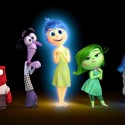This year at the San Diego Comic Con I was extremely honored to be able to interview the cast of Supernatural, among them Jared Padalecki, one of the leading actors on that television series. Padalecki recently opened up about his struggles with depression and started the Always Keep Fighting Campaign, intended to spread awareness.
Tag: depression
Psychology of ‘Inside Out’
‘Inside Out’ is a movie I’d been waiting for a year to see and, once again, Pixar did not disappoint. This is a movie I’m going to be assigning to many of my patients and doctoral students as a way to demonstrate important psychological principles.
Warning: some spoilers of the movie ahead
When a family member is suicidal – it can happen to anyone… it happened to me
When I woke up on Friday something felt wrong. It felt as if someone punched me in the gut repeatedly. Despair. Pushing away these emotions without taking the time to figure out why I was feeling them nor taking the time to provide myself with the compassion and comfort that I needed, I headed to Camp Pendleton, where I focused on my clients with PTSD.
Continue reading When a family member is suicidal – it can happen to anyone… it happened to me
Why being a geek is good for you
“Understanding is the first step to acceptance, and only with acceptance can there be recovery.”
J. K. Rowling
I recently had the tremendous honor of attending, giving a keynote speech, and presenting a panel at MISTI-Con, a Harry Potter-themed conference that takes place once every two years. It was marvelous. Between the enchanted ball, the wicked murder mystery dinner, and the magical people that attended the con and put it together, it was an unbelievable experience.
The Psychology of Black Canary (Laurel Lance)
I initially wrote this post for The Mary Sue for the Psychology of Inspirational Women panel. I’m reposting it here with permission.
The Background:
Black Canary is the alter ego of Dinah Laurel Lance, and was one of the first DC female superheroes, along with Wonder Woman. Black Canary’s initial name in DC comics was Dinah Drake, and in the later series the Black Canary was based on two separate people – mother (Dinah Drake) and daughter (Dinah Laurel Lance). In the comics Black Canary temporarily worked with the Justice League and also with Oracle (formerly, Batgirl).
Continue reading The Psychology of Black Canary (Laurel Lance)
Psychology of Buffy the Vampire Slayer
I initially wrote this post for The Mary Sue’s Column, Psychology of Inspirational Women, it is reprinted here with permission.
Going against the Hollywood stereotype of a powerless blonde girl getting ruthlessly murdered, the writer/director/producer of Buffy the Vampire Slayer wanted to create a hero, someone with the special powers to kick butt and protect others.
How X-Men helped me overcome PTSD
“What wouldn’t I give to be normal!”
(Mystique, ‘X-Men First Class’)
I grew up on fiction. It was brain food to me. I generally preferred to read books to just about any other activity. Over the past few years I’ve been incorporating fictional characters into Superhero Therapy. For me these characters hold a deep and personal meaning, after all, some of them actually helped me recover from my own traumatic history.
Psychology of The Hunger Games
“My name is Katniss Everdeen.
Why am I not dead?
I should be dead.”
Katniss Everdeen, the Girl on Fire, who volunteers to take her sister’s place in the monstrous Hunger Games, is a hero and a legend. After going through some of the most horrific events imaginable, Katniss attempts to end her own life. What caused her to try to commit suicide? Does Katniss suffer from a mental health disorder? What stops her from dying and what gives her a reason to live?
What is Superhero Therapy?
Did you ever want to be a Superhero? Did you ever wish that you could possess magical powers, like Harry Potter, or travel around the world in a time machine, called the T.A.R.D.I.S. with an alien who calls himself The Doctor? What if you could, in a way?
Many of us wish we had some kind of magical or extraordinary abilities, and many of us strongly identify with fictional characters, like Batman, Superman, Buffy the Vampire Slayer, characters from Harry Potter, Firefly, and many others. Recent research findings suggest that identifying with fictional characters can actually be extremely beneficial as it can teach us empathy, remind us that we are not alone in our painful experience, inspire us to eat healthier, and allow us to better cope with difficult life transitions.
Psychology of Harry Potter: Post 3 of 3 (depression)
“Numbing the pain for a while will make it worse when you finally feel it”
Albus Dumbledore, Harry Potter and the Goblet of Fire
While not many of us have lost our parents to a dark wizard, many of us can relate to a deep deep sense of loss, having lost someone or something that meant a lot to us. That is also the story of Harry Potter. From the very beginning of the series we learn about the terrible loss, depression, and trauma that Harry and later, his friends, endure.
Continue reading Psychology of Harry Potter: Post 3 of 3 (depression)









